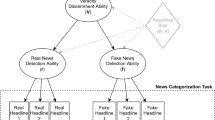Abstract
Adapting a definition introduced by Milgrom (1981) we say that a signal about the environment is good news relative to some initial beliefs if the posterior beliefs dominate the initial beliefs in the sense of first-order stochastic dominance (the assumption being that higher values of the parameter representing the environment mean better environments). We give an example where good news leads to the adoption of a more pessimistic course of action (we say that action a 1, reveals greater pessimism than action a 2, if it gives higher payoff in bad environments and lower payoff in good environments). We then give sufficient conditions for a signal not to induce a more pessimistic choice of action.
Similar content being viewed by others
References
Bonanno, G.: 1986, ‘Sudden and unexpected changes of attitude during negotiations’, paper presented at the First Annual Congress of the European Economic Association, Vienna, August 1986.
Lippman, S. A.and McCall, J. J.: 1982,‘The economics of uncertainty: selected topics and probabilistic methods’, in K. Arrow and M. D. Intrilligator (Eds.), Handbook of Mathematical Economics, Vol. I, North-Holland, pp. 211–284.
Milgrom, P.: 1981, ‘Good news and bad news: representation theorems and applications’, Bell Journal of Economics, 380–391.
Pratt, J. W.: 1964, ‘Risk aversion in the small and in the large’, Econometrica, 32, 122–136.
Author information
Authors and Affiliations
Additional information
A first version of this paper was written when the author was Heyworth Research Fellow at Nuffield College, Oxford, and presented at the Second Annual Congress of the European Economic Association (Copenhagen, August 1987). The author is grateful to an anonymous referee for helpful comments.
Rights and permissions
About this article
Cite this article
Bonanno, G. Can good news lead to a more pessimistic choice of action?. Theor Decis 25, 123–136 (1988). https://doi.org/10.1007/BF00134156
Issue Date:
DOI: https://doi.org/10.1007/BF00134156




